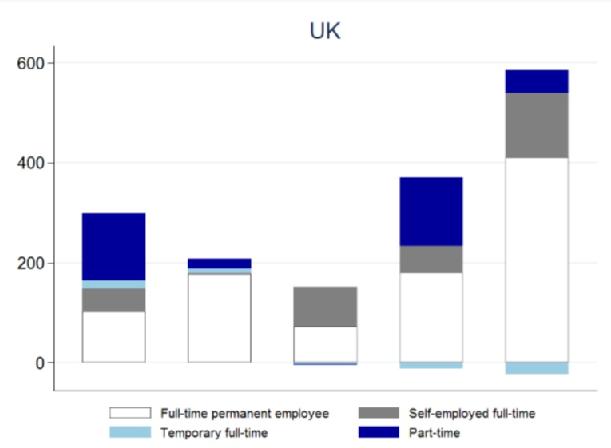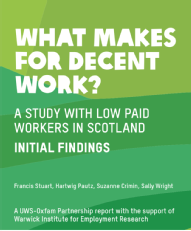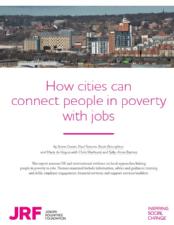IER News & blogs
Bad jobs, the bad jobs trap and the Brexit vote
Despite all of the talk about inter-generational betrayal by the old of the young, the largest ratio to vote leave was amongst low-skilled workers (70%). Their frustration and desire for something to change is understandable. They are in bad jobs, are too often stuck in these jobs and jostle more in these jobs with migrant workers. Their situation is a symptom of three developments that have occurred in the UK labour market since the economic crisis. First, job polarisation has consolidated. Second, non-standard employment has increased in the worst jobs. Third, UK-born workers have benefitted less from employment restructuring.
Levels of skill and pay are linked. Using pay as a proxy for job quality then dividing the pay range of jobs into quintiles and charting the expansion and contraction of the number and proportion of jobs in each quintile over time, Eurofound has been assessing employment restructuring across the EU. In Table 1 below, Quintile 1 on the left represents the bottom fifth of jobs by pay, Quintile 5 on the right the top fifth. It shows the polarisation of jobs in the UK over 2011-15 and how most jobs created in the bottom quintile are part-time, temporary or self-employment. Without a decent or solid wage floor, one consequence is that it is more difficult for these workers to plan their lives.
Table 1: Net employment change by job-wage quintile, decomposed by employment type, UK 2011-15 (1000s)

Source: Eurofound (2015)
Being in bad jobs is compounded by the lack of opportunity for many of these workers to escape into better jobs. By 2015 just over 10% of the UK workforce was not born in the UK. Further data from Eurofound shows these workers spread across the quintiles over 2011-15, but the largest proportion was employed in the bottom quintile – accounting for just over 20% of workers in this quintile. Across the EU generally, native workers have tended to shift from the lower quintile jobs; by contrast in the UK many native workers continue to work in these jobs. A bad jobs trap thus exists for many UK-born workers which also means that, disproportionality, they work alongside more migrant workers. From their perspective, things are unlikely to get any better any time soon for these UK-born workers.
Theresa May has promised to address the plight of these workers, saying that she is listening to their frustrations. A good place to start would be to introduce polices that offer employment enrichment that improves job quality and provides springboards out of bad jobs.
This blog draws on material from Chris Warhurst’s Accidental tourists: Brexit and its toxic employment underpinnings, Socio-Economic Review, 14(4): 819-825, 2016, and is one of a number of articles in the journal debating the factors associated with Brexit.
New report co-authored by Sally Wright on what makes decent work

An interim report on decent work has been published by Oxfam and the University of Scotland in collaboration with Warwick Institute for Employment Research. The report, co-authored by Sally Wright of IER, examines what low paid, low skilled workers in Scotland want from jobs. The report, What Makes For Decent Work?, can be freely downloaded.
New report on How cities can connect people in poverty with jobs
 This study, by Professor Anne Green with others from IER and in partnership with Dr Paul Sissons and Kevin Broughton (Coventry University), reviews UK and international evidence on local approaches linking people not in work to jobs, and those in work to better jobs. It looks at four stages in a stylised ‘pathway to employment’: pre-employment; employment entry; staying in work; and in-work progression. It found that variations in the challenges and opportunities facing cities have an impact on how anti-poverty policies are likely to succeed. Although there are differences in cities’ precise powers and resources, their policies can reduce poverty in their area. However, the evidence is clear that progress can be made without greater local autonomy and with no or limited additional resources. Among other factors in the success of anti-poverty strategies are how strong the local leadership is and what priority is given to change in local areas.
This study, by Professor Anne Green with others from IER and in partnership with Dr Paul Sissons and Kevin Broughton (Coventry University), reviews UK and international evidence on local approaches linking people not in work to jobs, and those in work to better jobs. It looks at four stages in a stylised ‘pathway to employment’: pre-employment; employment entry; staying in work; and in-work progression. It found that variations in the challenges and opportunities facing cities have an impact on how anti-poverty policies are likely to succeed. Although there are differences in cities’ precise powers and resources, their policies can reduce poverty in their area. However, the evidence is clear that progress can be made without greater local autonomy and with no or limited additional resources. Among other factors in the success of anti-poverty strategies are how strong the local leadership is and what priority is given to change in local areas.
For more information see:
Green, A.E., Sissons, P., Broughton, K., and de Hoyos, M. with Warhurst, C. and Barnes, S-A. (2015). How cities can connect people in poverty with jobs. York: Joseph Rowntree Foundation. (A Summary is also available)
IER report on the use of migrant labour published
A team at IER undertook a literature review and indepth interviews with key stakeholders on the use of migrant labour in low-skilled sectors, namely ‘construction’ and ‘accommodation and food services’, relative to other sectors of the economy. The study built on and expanded the existing evidence base focusing on the composition of the low-skilled workforce over time, a comparison of the different groups employed, and the characteristics of low-skilled sectors. The project report is now available:
Green, A., Atfield, G., Adam, D. and Staniewicz, T. (2013). Determinants of the Composition of the Workforce in Low Skilled Sectors of the UK Economy, Lot 2: Qualitative Research – Final Report
 . Report for Migration Advisory Committee (MAC). London: UK Borders Agency, Home Office.
. Report for Migration Advisory Committee (MAC). London: UK Borders Agency, Home Office.
Do you work in the hotels, restaurants or fast food outlets industry or in the construction industry in the West Midlands?
If so, we would love to talk to you.
The Institute for Employment Research at the University of Warwick is doing some research for the Home Office on why and how different groups of people work in hotels, restaurants and fast food outlets or in the construction industry in the Greater West Midlands area. The experiences of those working in these two sectors of the economy will be compared and contrasted.
